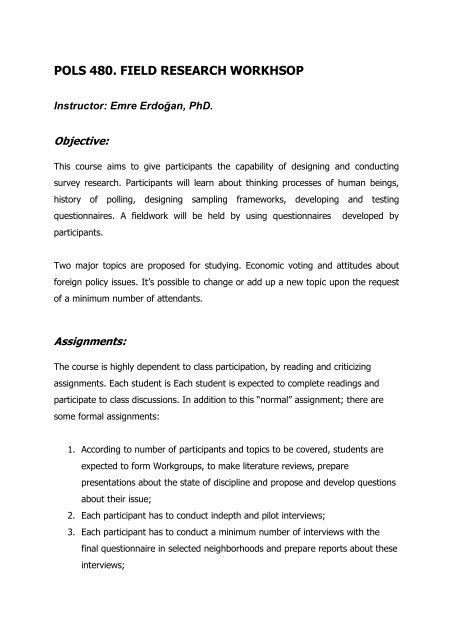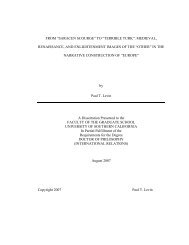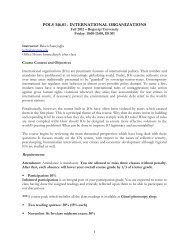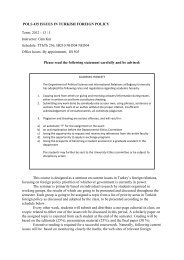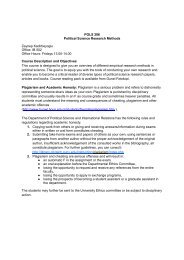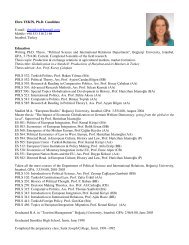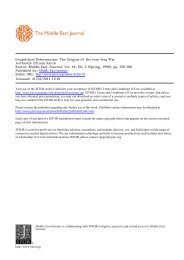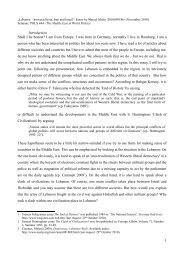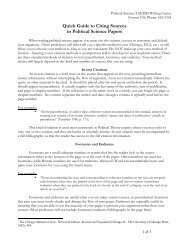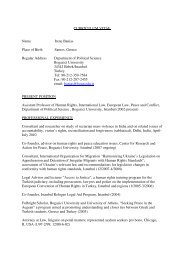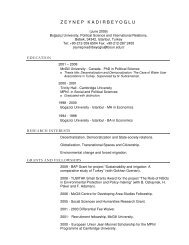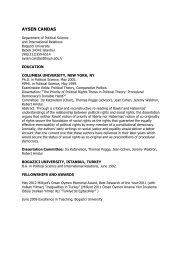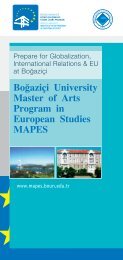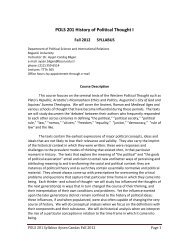Week 1 - Department of Political Science and International Relations
Week 1 - Department of Political Science and International Relations
Week 1 - Department of Political Science and International Relations
Create successful ePaper yourself
Turn your PDF publications into a flip-book with our unique Google optimized e-Paper software.
POLS 480. FIELD RESEARCH WORKHSOP<br />
Instructor: Emre Erdoğan, PhD.<br />
Objective:<br />
This course aims to give participants the capability <strong>of</strong> designing <strong>and</strong> conducting<br />
survey research. Participants will learn about thinking processes <strong>of</strong> human beings,<br />
history <strong>of</strong> polling, designing sampling frameworks, developing <strong>and</strong> testing<br />
questionnaires. A fieldwork will be held by using questionnaires developed by<br />
participants.<br />
Two major topics are proposed for studying. Economic voting <strong>and</strong> attitudes about<br />
foreign policy issues. It’s possible to change or add up a new topic upon the request<br />
<strong>of</strong> a minimum number <strong>of</strong> attendants.<br />
Assignments:<br />
The course is highly dependent to class participation, by reading <strong>and</strong> criticizing<br />
assignments. Each student is Each student is expected to complete readings <strong>and</strong><br />
participate to class discussions. In addition to this “normal” assignment; there are<br />
some formal assignments:<br />
1. According to number <strong>of</strong> participants <strong>and</strong> topics to be covered, students are<br />
expected to form Workgroups, to make literature reviews, prepare<br />
presentations about the state <strong>of</strong> discipline <strong>and</strong> propose <strong>and</strong> develop questions<br />
about their issue;<br />
2. Each participant has to conduct indepth <strong>and</strong> pilot interviews;<br />
3. Each participant has to conduct a minimum number <strong>of</strong> interviews with the<br />
final questionnaire in selected neighborhoods <strong>and</strong> prepare reports about these<br />
interviews;
4. At the end <strong>of</strong> term, a take home exam will be given;<br />
Grading:<br />
1. Class Participation:10 Percent<br />
2. Presentations: 10 Percent<br />
3. Cognitive testing reports: 15<br />
4. Interviews. 15 Percent<br />
5. Take Home Exam: 50 Percent<br />
<strong>Week</strong> 1-February<br />
24th,<br />
<strong>Week</strong> 2- March 2nd;<br />
<strong>Week</strong> 3,<br />
March 9th;<br />
<strong>Week</strong> 4,<br />
March 16th,<br />
<strong>Week</strong> 5,<br />
March 23th,<br />
No Class,<br />
No Class<br />
Introduction<br />
What’s Public Opinion<br />
Thinking About Thinking<br />
Sampling<br />
H. <strong>of</strong> POR, pp.11-24; pp.83-93;<br />
pp.104-112<br />
H. <strong>of</strong> PM, pp.217-270; Elster, pp.7-<br />
52; Tversky <strong>and</strong> Kahnemann; H. <strong>of</strong><br />
POR, pp.127-140; pp.164-172;<br />
pp.175-183; pp.205-217<br />
H. <strong>of</strong> POR, pp.294-308; Kalton;<br />
<strong>Week</strong> 6, March 30th; Psychology <strong>of</strong> Survey Response; Tourengau et. al, pp.1-61; Alvarez<br />
<strong>and</strong> Brehm, pp. 15-51; H. <strong>of</strong> POR,<br />
361-373; pp374-388<br />
<strong>Week</strong> 6;<br />
April 6th;<br />
Questionnaire Design <strong>and</strong><br />
Interviewing<br />
Fowler, pp.1-104<br />
<strong>Week</strong> 7;<br />
April 13th;<br />
<strong>Week</strong> 8;<br />
April 20th;<br />
<strong>Week</strong> 9;<br />
April 27th;<br />
<strong>Week</strong> 10;<br />
May 4th;<br />
<strong>Week</strong> 11;<br />
May 11th;<br />
<strong>Week</strong> 12; May 18th;<br />
Improving Questions<br />
Spring Break<br />
Cognitive Interviewing<br />
Data Entry<br />
Basic Data Analysis<br />
Presentations<br />
Fowler, pp.105-179 <strong>and</strong><br />
Presentations<br />
Willis
Basic Readings about Polling<br />
Alvarez, R. M. <strong>and</strong> Brehm J.; 2002; Hard Choices <strong>and</strong> Easy Answers; Princeton<br />
University Press;<br />
Elster, J. 2007, Explaining Social Behavior: More Nuts <strong>and</strong> Bolts for the Social<br />
<strong>Science</strong>s, Cambridge University Press.<br />
Fowler, F. J., 1995; Improving Survey Questions; Sage;<br />
Kalton, G., 1983; Introduction to Survey Sampling; Sage University Press;<br />
Oxford H<strong>and</strong>book <strong>of</strong> <strong>Political</strong> Methodology (H<strong>of</strong>PM)<br />
The Sage H<strong>and</strong>book <strong>of</strong> Public Opinion Research (H<strong>of</strong>POR)<br />
Tourengeau R.; Rips, L. J. Rips, K. Rasinski; 2000; The Psychology <strong>of</strong> Survey<br />
Response; Cambridge University Press;<br />
Tversky A. <strong>and</strong> Kahnemann D.; Judgment under Uncertainty: Heuristics <strong>and</strong> Biases; <strong>Science</strong>,<br />
New Series, Vol. 185, No. 4157 (Sep. 27, 1974), pp. 1124-1131;<br />
Basic Readings about Topics:<br />
Economic Voting:<br />
Anderson, C. J. (2007), "The End <strong>of</strong> Economic Voting? Contingency Dilemmas <strong>and</strong><br />
the Limits <strong>of</strong> Democratic Accountability," Annual Review <strong>of</strong> <strong>Political</strong> <strong>Science</strong><br />
(10:1), pp. 271-296.<br />
Başlevent, C., Kirmanoğlu, H. <strong>and</strong> Şenatalar, B. (2005), “Empirical Investigation <strong>of</strong><br />
Party Preferences <strong>and</strong> Economic Voting in Turkey”, European Journal <strong>of</strong><br />
<strong>Political</strong> Research, V:44, pp. 547–562
Çarkoğlu, A. (2008), “Ideology or Economic Pragmatism?: Pr<strong>of</strong>iling Turkish Voters in<br />
2007”, Turkish Studies, Vol.9, No. 2, pp.317–344<br />
Çarkoğlu, A. <strong>and</strong> Kalaycıoğlu, E. (2007), Turkish Democracy Today: Elections, Protest<br />
<strong>and</strong> Stability in an Islamic Society, London : I. B. Tauris,<br />
Esmer, Y. <strong>and</strong> Pettersson T. (2007) 'The effects <strong>of</strong> religion <strong>and</strong> religiosity on voting<br />
behavior.' in Klingeman, H. <strong>and</strong> Dalton,R.(Eds), The Oxford H<strong>and</strong>book <strong>of</strong><br />
<strong>Political</strong> Behavior, Oxford: Oxford University Press.<br />
Esmer, Y., “At the ballot box: Determinants <strong>of</strong> voting behavior in Turkey” In Politics,<br />
Parties <strong>and</strong> Elections in Turkey, Y. Esmer <strong>and</strong> S. Sayarı (eds.), Boulder:<br />
Lynn Rienner, 2002.<br />
Hazama, Y., (2006),” Retrospective Voting in Turkey: Macro <strong>and</strong> Micro Perspectives”,<br />
Institute <strong>of</strong> Developing Economies, JETRO,<br />
Lewis-Beck, M. S., Nadeau, R. <strong>and</strong> Elias, A. (2008), "Economics, Party, <strong>and</strong> the Vote:<br />
Causality Issues <strong>and</strong> Panel Data," American Journal <strong>of</strong> <strong>Political</strong> <strong>Science</strong><br />
(52:1), pp. 84--95.<br />
S<strong>and</strong>ers, D. <strong>and</strong> Gavin, N. (2004), "Television News, Economic Perceptions <strong>and</strong><br />
<strong>Political</strong> Preferences in Britain, 1997-2001," The Journal <strong>of</strong> Politics (66:4),<br />
pp. 1245-1266.<br />
Tilley, J. <strong>and</strong> Hobolt, S. B. (2011), "Is the Government to Blame? An Experimental<br />
Test <strong>of</strong> How Partisanship Shapes Perceptions <strong>of</strong> Performance <strong>and</strong><br />
Responsibility," The Journal <strong>of</strong> Politics (73:02), pp. 316--330.
Public Opinion <strong>and</strong> Foreign Policy Issues<br />
Caspary, W., 1970, “The ‘Mood Theory’: A Study <strong>of</strong> Public Opinion <strong>and</strong> Foreign<br />
Policy,” The American <strong>Political</strong> <strong>Science</strong> Review, Vol. 64, No. 2, s. 536-547.<br />
Çarkoğlu, A. 2003, “Who Wants Full Membership? Characteristics <strong>of</strong> Turkish Public<br />
Support for EU Membership,” Turkish Studies, Vol. 4, No 1.<br />
Gönlübol, M. 1968, "Kamuoyu ve Dış Politika," Ankara Üniversitesi Siyasal Bilgiler<br />
Fakültesi Dergisi, C. 23, No. 4, s. 87-110.<br />
Holsti O., 1992, Public Opinion <strong>and</strong> Foreign Policy Challenges to the Almond-<br />
Lippman Consensus,” <strong>International</strong> Studies Quarterly, 1992, 36, s. 440.<br />
Kalaycıoğlu, E., 2009, “Public Choice <strong>and</strong> Foreign Affairs: Democracy <strong>and</strong><br />
<strong>International</strong> <strong>Relations</strong> in Turkey,” New Perspectives on Turkey, No. 4,<br />
Bahar 2009.<br />
Peffley <strong>and</strong> Hurwitz, 1987 "How Are Foreign Policy Attitudes Structured? A<br />
Hierarchical Model," (Jon Hurwitz ile birlikte), American <strong>Political</strong> <strong>Science</strong><br />
Review, 81(4): s. 1099-1120.<br />
Şenyuva Ö. 2006, “Turkish Public Opinion <strong>and</strong> European Union: The State <strong>of</strong> the Art<br />
in Public Opinion Studies in Turkey,” Perceptions, Bahar 2006.<br />
Yılmaz, H. 2004,, “Turkey, within or outside Europe? A Historical Perspective,”<br />
Proceedings <strong>of</strong> IMEIS ve Collingwood College Seminar, University <strong>of</strong><br />
Durham, 2004.


